Catching Up With Mindi O'Brien IFBB Pro
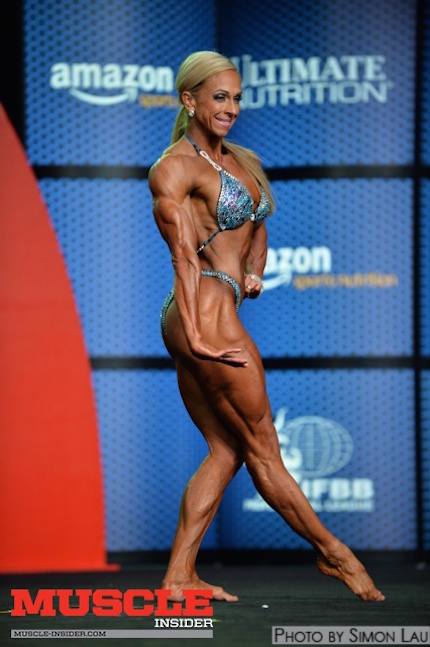
“The Life of O’Brien”: An interview with Canada’s most distinguished pro
She competed provincially in gymnastics for 15 years growing up. Then she moved on to compete in various fitness shows for eight years. In 2004, she competed at the CBBF Nationals and won her IFBB pro card in fitness. She was immediately signed to a contract with a supplement company because the owner saw something special in her. He was right, because in the same year she won her pro card, she went on to place first in her pro debut (the IFBB Southwest Pro), and thus qualified for her first Olympia. Mindi O’Brien placed ninth in her first Olympia, immediately after winning her pro debut. That’s when the Canadian fitness industry knew it had a superstar.
This year marked her tenth Olympia appearance, and seventh Arnold Classic (eighth, if you include the 2011 Arnold Classic Europe). She has competed in 36 shows in total, placing out of the top 10 only a handful of times. Up until recently, Mindi was known for her exceptional fitness routines, but when the IFBB announced women’s physique in 2011, she switched gears and decided to own that division instead.

In March 2015, things again took an interesting turn when Mindi announced that she was starting “wrestling school.” She competed in a House of Hardcore wrestling event, and needless to say, she won, and no one who knows her was surprised! There’s really nothing this bombshell can’t do. According to Steve Wennerstrom, the IFBB’s foremost historian on all things female and fitness related, Mindi has “established her stature among the competitive elite of the IFBB. Seemingly, each time she competes, another level of excellence is reached.” This past August, when Mindi won the Tampa Pro and earned her Olympia qualification, she earned the distinct honour of being one of the only pros to win a show in both fitness and physique. And as of this past Olympia weekend, she became the only competitor to do both the Arnold and Olympia in two different categories. She has competed in six Fitness Olympias and three Physique Olympias.
Very few athletes can do what Mindi has done, and continues to do, with respect to crossing over between divisions, her longevity in the sport, her conditioning and stage presence, and her posing, grace, and elegance. She’s a one-of-a-kind star. To finish with another Steve Wennerstrom quote, “[Mindi is] one of Canada’s best in the bodysport world. And it will take very special athletes to approach what she has accomplished in her multi-faceted career.”
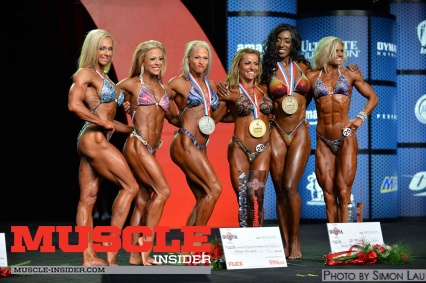
Q. Right off the bat, how do you feel about the 2015 Olympia?
A. I thought I’d squeak into the top five, but I’m not going to complain about sixth. Honestly, I don’t know what changed between the morning pre-judging when I was in first call-outs, and then later. I don’t know. Everything was exciting up until awards. I feel really good. There’s nothing else I could have brought to the stage; I did a good routine, and I left it all on the stage to let the judges decide.
Q. You’ve done 10 Olympias and eight Arnold Classics, you’ve been competing since 1996, and you’ve been a pro since 2004. To what do you attribute your longevity in the fitness industry?
A. I think just learning to train smarter. I don’t really know. I listen to my body now more than I used to. I used to just push through everything when I was doing fitness. I’d push through the pain and injuries; I competed with a fractured back and a broken ankle. I guess as the years go on, you just get smarter with your training and listen to your body. When you’re sore, you take a rest, and when you’re good to go, you push hard. I’m pretty consistent with my nutrition, meaning that I don’t fluctuate in my off-season, maybe only five to seven pounds. It’s more of a lifestyle than anything. I don’t have all the rebounding and everything in terms of weight.
Q. When do you typically start contest prep, and what changes in terms of training, cardio, diet, and supplements?
A. I obviously up my cardio a little bit, to up my conditioning. But for me it’s more of a mental state; when I commit to a show and count backwards to how many days I have left, then my brain kicks over, goes into overdrive, and I come in conditioned.
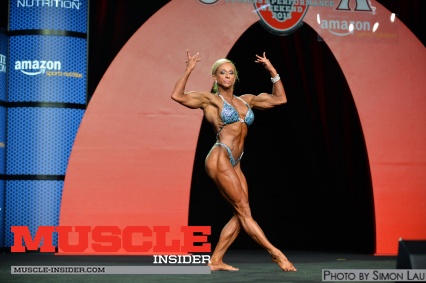
Q. How did your training and diet change from fitness to physique?
A. When I switched to physique, there aren’t as many routines and stuff, so the impact on the body isn’t as bad. I actually brought down my cardio a lot. When I was doing fitness, I used to think that more was better, so I was coming in over-conditioned because of all the cardio. So I needed to put on some more size and focus more on lifting heavy, and analyzing my overall physique. Training heavier with weights and doing less cardio has really helped me. Fitness is so hard on the body, and when I was competing, we had two routines and two physique rounds. Once I switched over, I had to work around my back injury, so I started fine-tuning everything in the gym.
Q. What do you love about the sport so much that’s kept you in the game since 1996?
A. I think because (a) I feel good mentally, spiritually, and physically, and (b) because you’re never done. There’s never a day where you look in the mirror and say, “That’s it, I’m done.” You’re always looking to progress, so my off-season is actually my favourite time because that’s when you make all the small changes to your physique. Then you challenge yourself to achieve those goals when you take your body to the stage. After that, you put a new plan together for the next time you want to get onstage.
Q. Knowing you’re never done, and it’s ongoing, when do you know when it’s time to hang up the posing suit?
A. I’ve come to that bridge a few times where I think I’ve brought the best package that I could. Last year at the Arnolds was going to be my last show. It was my worst prep; I was going through a lot of personal issues and I didn’t peak for that show, so there were a lot of things I wanted to change for this year. I did a better Olympia for myself personally this year. I’ll do another Arnold and then reassess from there. I don’t feel like I’ve accomplished everything I’ve set out to do yet. But for now, I don’t know.
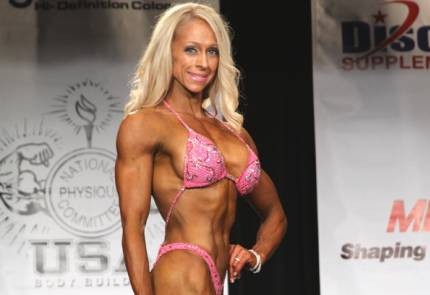
Q. In 2011, you placed third at the Toronto Pro in fitness, and then in 2013, you placed third in women’s physique. How does it feel knowing you can be so versatile?
A. I honestly didn’t know how I would do in physique. After I retired from fitness, I was heartbroken that I couldn’t compete. The Toronto Pro was a test, and Mike Davies said I could do it about five weeks out. I wanted to see how my body would hold up against everyone else’s. In fitness, I was always marked down because my body was too hard and muscular, so I didn’t know how I would do in physique. Placing third was what gave me the confidence to go forward in that category.
Q. In 2010, you had a super-short season compared to all your others, and in 2012, you were noticeably absent from any pro show. What happened over those two years? Where did you go?
A. Well that’s when I fractured my back, at the Olympia. So I had to take time off for that, obviously. So I was forced to retire at that point. I didn’t stop training or anything. During that time, I also had two miscarriages, and I became a wreck. It was awful. I became obsessed with getting pregnant and crazy, and I almost went into a depression. I had to get myself back in the gym and refocus. That’s why I got back into competing, because I was in such a bad place emotionally.
Q. Working with the famous guru George Farah—what’s that like?
A. I reached out to him after I saw Dana Linn Bailey doing so well. He does my nutrition, and I do my own training. I reach out to him just before shows to assess how things are going. But he’s great and I like him! My diet doesn’t change a lot throughout the season; we tweak things here and there, like increase my protein or my carb, (I eat more carbs now than I ever have in my whole life), but I feel good all the time.
Q. What’s next for you? What’s in your one-, three-, and five-year plans?
Well, I’m going to apply for the Arnolds in 2016, so hopefully I’ll get in as a competitor. As far as myself as a coach, I’m going to continue building my team. We have a strong team going to the Arnold Amateurs. Then May 7, 2016, we have the GNC Mindi O’Brien Extravaganza. It’s going to be a regional show, where we’ll also hook up with the House of Hardcore wrestling. We signed a TV deal with The Fight Network, and we’re including a model search. We’re excited because it’s going to be huge.
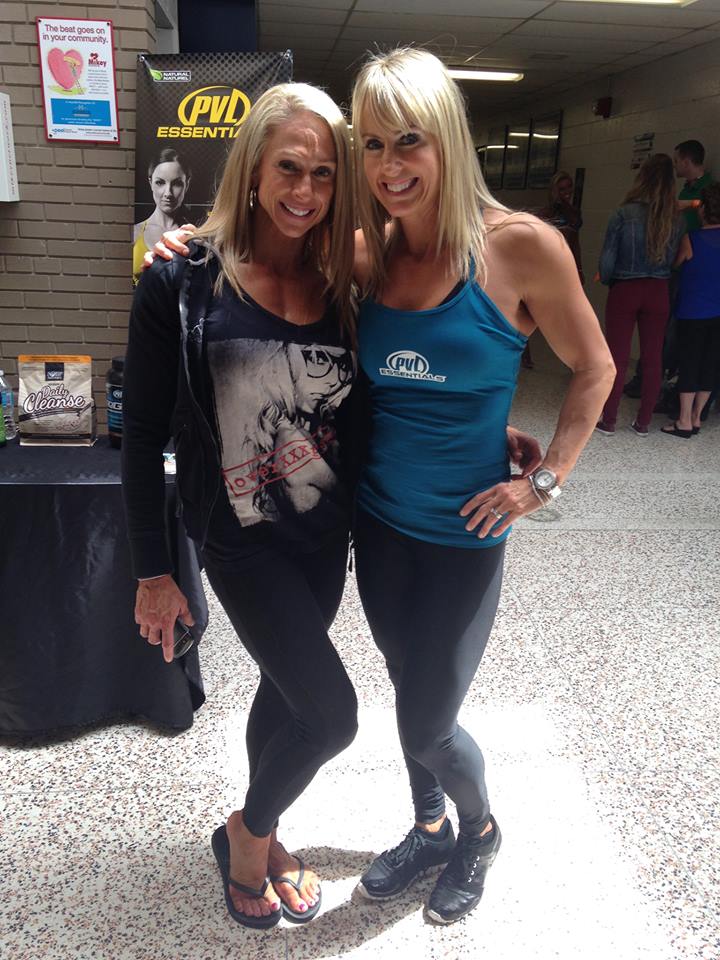
Q. There’s a lot of talk in the industry about not being able to “make it” as a Canadian; do you believe this?
Well, hopefully, that will change; I mean, Myriam Capes just placed second at the Arnold Classic Europe. I think we are seeing Canadians being respected more on the pro circuit. A lot of us are making our names and being recognized. I do feel like it is changing, and because there are more shows internationally, then we’ll start to see more Canadians being recognized for their talent.
Q. How do you feel about the Steve Wennerstrom quote regarding you being one of Canada’s best?
A. Steve was at my first pro show, and he took me aside and told me about the IFBB and what to expect. He took me under his wing and guided me back in 2004. We’ve stayed in touch this whole time, so when I read it, I really got emotional and teary eyed. Coming from him and who he is in the industry, I can’t even begin to explain. I don’t think of myself like that, so when someone like Steve who’s on that level says something like that about me, it’s pretty awesome.
Q. What legacy do you want to leave on the industry?
A. This is a very tough question for me to answer; when I consider the people who have left legacies, I think of Neil Armstrong, George Washington, Gandhi, and other revolutionaries. I truthfully struggle to come up with a legitimate response. If pressed, I would consider that my greatest achievements aren’t the ones that happened onstage, but perhaps what has happened behind the scenes. In 2009, I slipped during the Fitness Olympia and fractured my back in the middle of my routine. My doctors told me that my career was over, and that a return to this amazing sport was all but a pipe dream. Well, here I am, six years later, tying my career best at my tenth Olympia and receiving top-three finishes at shows. I suppose my legacy is triumph. Not the classic “winning the championship for the fourth time,” but overcoming my own personal issues and battling through adversity and injury to regain form once again and compete in this sport I love. I chose to endure the pain, and I vowed that I would once again compete in the Olympia. I want people to look back at me and say, “She never gave up.” That is my legacy.
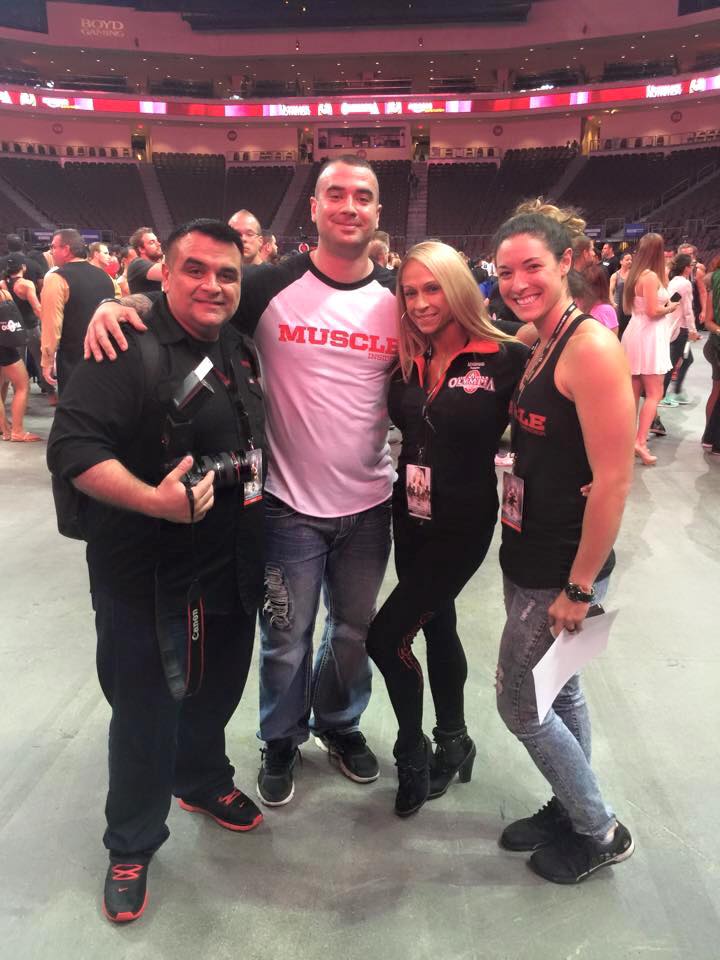
For another feature on Mindi O'Brien, click here!
Click on the links to find Mindi on Facebook, Instagram, Twitter

